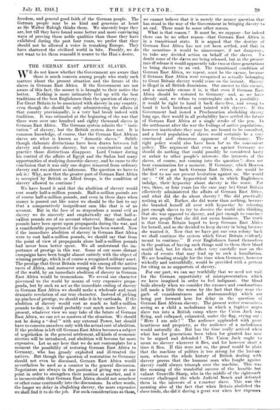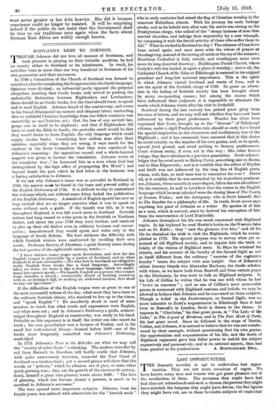THE GERMAN EAST AFRICAN SLAVES.
WE do not know whether the Government are aware that there is much concern among people who study such matters about the present situation and the future of the slaves in German East Africa. If the Government are not aware of this fact, the sooner it is brought to their notice the better. Nothing is more intimately tied up with the best traditions of the best Englishmen than the question of slavery. For Great Britain to be associated with slavery in any country, even though she should be only administering the affairs of that country provisionally, is a very bad break indeed with tradition. It was estimated at the beginning of the war that there were over one hundred and eighty thousand slaves in German East Africa. The German system admits the insti- tution " of slavery, but the British system does not. It is common knowledge, of course, that the German East African slaves are what is known as " domestic slaves." Subtle though elaborate distinctions have been drawn between full slavery and domestic slavery, but on examination and in practice those distinctions disappear. Lord Cromer during his control of the affairs of Egypt and the Sudan had many opportunities of studying domestic slavery, and he came to the conclusion that it was only one degree removed from ordinary slavery and was almost as infamous. The question we have to ask is : Why, now that the greater part of German East Africa is occupied by British or Allied troops, is the condition of slavery allowed to continue ?
We have heard it said that the abolition of slavery would cost nearly half-a-million pounds. Half-a-million pounds are of course half-a-million pounds, and even in these days when money is poured out like water we should be the last to say that a comparatively insignificant sum like that is of no account. But in the face of so stupendous a moral evil as slavery we do sincerely and emphatically say that half-a- nillion pounds are of no account whatever. Many millions of pounds have been spent upon propaganda during the war, and a considerable proportion of the money has been wasted. Now if the immediate abolition of slavery in German East Africa were to cost half-a-million pounds, we should say that from the point of view of propaganda alone half-a-million pounds had never been better spent. We all understand the im- portance of prestige in this war. Some of our more distant campaigns have been fought almost entirely with the object of winning prestige, which is of course a recognized military asset.
The prestige that Great Britain would win among all the native races of Africa, and moreover among all the humane nations of the world, by an immediate abolition of slavery in German East Africa would be tremendous. We reveal our character piecemeal to the world by means of very expensive propa- ganda, but by such an act as the immediate ending of slavery in German East Africa we should make a wholesale and most dramatic revelation of our true character. Instead of picking up pinches of prestige, we should rake it in by cartloads. If the abolition of slavery would cost as much as half-a-million pounds to-day, it would probably cost much more later. At present, whatever view we may take of the future of German East Africa, we can act as masters of the situation. We should not be doing a " deal " with any external Power, but should have to concern ourselves only with the actual cost of abolition. If the problem is left till German East Africa becomes a subject of negotiation in the general settlement, all kinds of economic niceties will be introduced, and abolition will become far more expensive. Let us say here that we do not contemplate for a moment the possibility of restoring German East Africa to Germany, who has grossly exploited and ill-treated the natives. But though the question of restoration to Germany should not even be discussed, German East Africa would nevertheless be used as a counter in the general discussion. Negotiators are always in the position of giving way at one point in order to strengthen their position at another, and it is inconceivable that German East Africa should not somehow or other come continually into the discussions. In other words, the longer we delay in abalishing slavery, the more expensive we shall find it to do the job. For such considerations as these, we cannot believe that it is merely the money question that has stood in the. way of the Government in bringing slavery to an end. There must be sonic other reason.
What. is that reason ? It must be, we suppose—for indeed there can be no other reason—that German East Africa is in a transitional state. It is argued that the destiny of German East Africa has not yet been settled, and that in the meantime it would be unnecessary, if not dangerou3, to take any decided action on behalf of the slaves. No doubt some of the slaves are being released, but at the present rate df release it would apparently take two or three generations to bring slavery to an end. The transitional condition of German East Africa, we repeat, must be the excuse, because if German East Africa were recognized as actually belonging to Great Britain slavery would cease on the instant. Slavery is illegal in all British dominions. Our answer to this excuse, and a miserable excuse it is, is that even if German East Africa should be restored to Germany—and, as we have already said, we refuse to contemplate such a possibility-- it would be right to hand it back slave-free, and wrong to hand it back burdened and tainted with slavery. If the Government had issued a Proclamation abolishing slavery long ago, they would in all probability have settled the future of German East Africa at a, single stroke of the pen. hi the settlement after the war the feelings of native population', however inarticulate they may be, are bound to be consulted, and a freed population of slaves would certainly be a very convinced and clamorous opponent of Germany. The right policy would also have been for us the convenient policy. The argument that even as against Germany we should do nothing that could possibly be considered hasty or unfair to other people's interests—the interests of the slaves, of course, not coming into the question !—does not bear examination for a moment. If Germany, which Heaven forbid ! ever got back German East Africa, she would be the first to use our present hesitation against us. She would say : " Of all the hypocritical talk in which Englishmen indulge, their• hypocrisy about slavery is the worst. For two, three, or four years [as the case may be] Great Britain effectively administered the affairs of German East Africa, and what did she do about slavery ? She did practically nothing at all. Rather, she did worse than nothing, beeaus, she branded herself all over with hypocrisy by releasing just enough slaves to try to deceive the world into thinking that she was opposed to slavery, and just enough to convince her own people that she did not mean business. The truth is that Great Britain hoped to keep German East Africa for herself, and so she decided to keep slavery in being because she wanted it. Now that we have got our own colony back we shall continue the system which Great Britain evidently meant to continue." If ever Englishmen found themselves in the position of having such things said to them their blood would boil, but let them reflect very carefully now on the chain of events that may lead up to such a humiliation. We are heading straight for the time when Germany, however wickedly and untruthfully, would be provided with a pretext for citing us as supporters of slavery.
For our part, we can say truthfully that we need not wait for the .German opportunity of misrepresentation which we have imagined in order to feel indignant. Our blood boils already when we consider the excuses and condonation.; (all made a little the worse by the fact that they wear the garb of considerateness and statesmanship) which are being put forward here for delay in the question of German East African slaVery. The present writer remember.; seeing as a child a melodrama in which a fugitive negro slave ran into a British camp where the Union Jack will flying, and collapsed, exhausted, under the flag, crying out : " Here I am safe ! " The audience applauded with great heartiness and propriety, as the audience of a melodrama would naturally do. But has the time really arrived when what has for generations been taken for granted has now to be argued and defended ? The Union Jack ought to mean no slavery wherever it flies, and for however short a time it flies. If this were' not so, the proof would be plain that the machine of politics is too strong for the human man, whereas the whole history of British dealing with slavery proves that the humane man who fought against slavery could always triumph over the machine. This way the meaning of the wonderful success of the humble but valiant Granville Sharp, who in the middle of the eighteenth century challenged the whole Judicial Bench and defeated them in the interests of a ranaway slave. This was the meaning also of the fact that when Britain abolished the slave trade, she did it during a great war • when her expenses were never greater or her debt heavier. She did it because conscience could no longer be resisted. It will be surprising indeed if the public do not insist that the Government shall be true to our traditions once again when the facts about German East Africa are widely enough known.



























 Previous page
Previous page